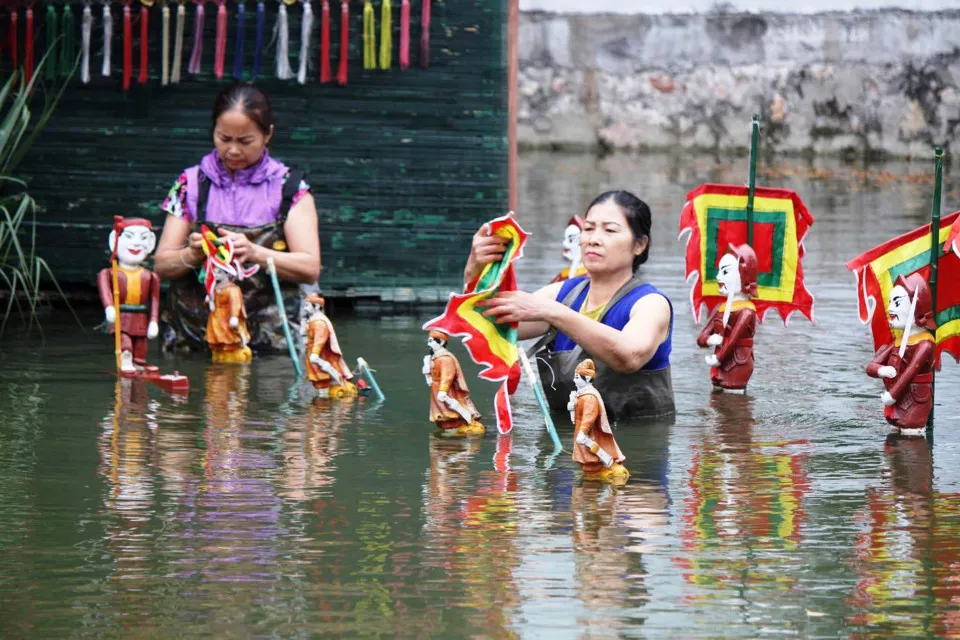Vietnam to set up cultural heritage conservation fund
In the context of a tight state budget, the creation of a dedicated public fund for the urgent protection and promotion of cultural heritage values is imperative.
The government intends to establish a fund to support the protection and promotion of cultural heritage values that is not covered by the state budget.
| Performing water puppet show in Dong Anh District, Hanoi. Photo: Kien Hai/The Hanoi Times |
Minister of Culture, Sports, and Tourism Nguyen Van Hung announced the plan when he presented the draft revised Cultural Heritage Law to the National Assembly on June 18.
Article 90 of the draft law proposes the creation of an extra-budgetary cultural heritage conservation fund. This fund aims to protect intangible cultural heritage at risk of being lost or forgotten.
The fund will be used to preserve and enhance the value of state-managed relics; purchase and repatriate Vietnamese antiques and documentary heritage from abroad; and complete collections of artifacts, antiques, and valuable national treasures for public museums.
The fund's financial resources will come from domestic and foreign organizations and individuals through donations, sponsorships, and other legitimate sources outside the state budget, Hung noted, adding that the state budget will not support the fund's activities.
As such, Hung stressed that the cultural heritage conservation fund will operate on a non-profit basis, following regulations on budget planning, accounting, and auditing to ensure financial transparency and accountability.
According to the Ministry of Culture, Sports, and Tourism, the current law only stipulates that the state has policies to protect and promote cultural heritage values and encourages organizations and individuals to contribute and sponsor, but the regulations are unclear and difficult to implement.
Vietnam's cultural heritage is vast and diverse, with many intangible cultural heritages in danger of being lost. Many national and special national relics have been severely damaged, and many valuable artifacts remain abroad.
In the context of a tight state budget, the creation of a dedicated public fund for the urgent protection and promotion of cultural heritage values is imperative.
“The legal basis for establishing the fund is to solve issues in the cultural heritage sector and implement the Party and State policies on developing cultural industries, preserving heritage values, and promoting socio-economic development and tourism,” said Hung.
The reviewing body, the Culture and Education Committee under the National Assembly, noted that in Resolution 792/2019 on managing and using state financial funds outside the budget, the National Assembly Standing Committee had asked the government to review and assess the effectiveness of such funds under various laws.
The National Assembly has abolished several funds, such as the HIV Support and Care Fund, the Medical Support Fund, and the Alcohol Harm Prevention Fund. Therefore, the committee recommends that the drafting authority continue to better explain the necessity, legal basis, impact assessment, and feasibility of establishing the cultural heritage conservation fund.
Besides the fund-related content, the revised Cultural Heritage Law stipulates that artifacts (valuable items passed down through generations) and antiques (items over 100 years old) owned privately or collectively can only be transferred, exchanged, donated, inherited, and traded domestically. The State will manage the transfer of artifacts, antiques, and national treasures and facilitate the transfer of these items by organizations and individuals.
The Ministry of Culture, Sports, and Tourism also proposed that the transfer of artifacts, antiques, and national treasures be governed by the Civil Code and other relevant laws. The State will be given preference in transactions to acquire these items and individuals, organizations, and non-public museums are encouraged to bring valuable Vietnamese artifacts and antiques back to Vietnam from abroad.











